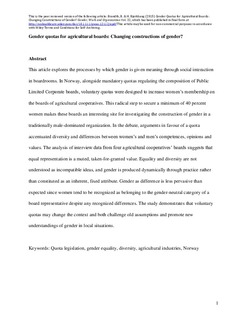Gender quotas for agricultural boards: changing constructions of gender?
Peer reviewed, Journal article
Accepted version
Permanent lenke
http://hdl.handle.net/11250/2484921Utgivelsesdato
2015Metadata
Vis full innførselSamlinger
- Artikler [231]
- Publikasjoner fra CRIStin [463]
Sammendrag
This article explores the processes by which gender is given meaning through social interaction in boardrooms. In Norway, alongside mandatory quotas regulating the composition of Public Limited Company boards, voluntary quotas were designed to increase women's membership on the boards of agricultural co-operatives. This radical step to secure a minimum of 40 per cent women makes these boards an interesting site for investigating the construction of gender in a traditionally male-dominated organization. In the debate, arguments in favour of a quota accentuated diversity and differences between women's and men's competences, opinions and values. The analysis of interview data from the boards of four agricultural co-operatives suggests that equal representation is a muted, taken-for-granted value. Equality and diversity are not understood as incompatible ideas, and gender is produced dynamically through practice rather than constituted as an inherent, fixed attribute. Gender as difference is less pervasive than expected as women tend to be recognized as belonging to the gender-neutral category of a board representative despite any recognized differences. The study demonstrates that voluntary quotas may change the context and both challenge old assumptions and promote new understandings of gender in local situations.
